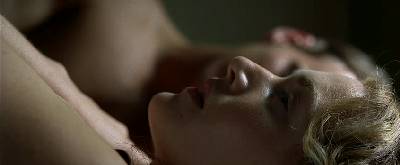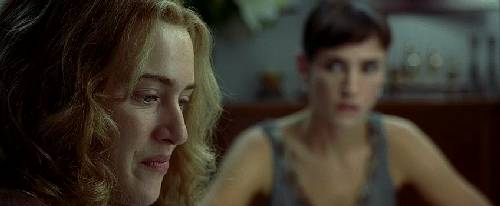Little Children (Todd Field, 2006)

Todd Field’s Little Children is an impressive film that jumps off from a potentially hazardous premise. A known sex offender, Ronnie McGorvey (Jackie Earle Haley), moves into an upper-middle class community, and the local parents are scared and outraged. Flyers with the man’s photo are distributed, and some of the parents resort to harassment and vigilante behaviour. Contrasted against this is the unfolding soap opera of the bookish Sarah (Kate Winslet), who starts an affair with the hunky stay-at-home father Brad (Patrick Wilson). As the relationship unfolds, other forms of social dysfunction, less serious but more prevalent, are explored. Field contrasts reactions to the ultimate, unforgiveable transgressions (represented by the fear of what Ronnie might do to local children) with the more everyday neglect and manipulation of children by parents preoccupied with their own gratification. The children in the film are all too often props in their parents’ lives, used as excuses to socialise, alibis to cover illicit meetings, or as sources of information about their spouse’s actions.
The invocation of child abuse in any form raises innumerate hazards for a filmmaker. The extreme emotional response to the topic is one of the film’s subjects, but it is also a potential handicap both in finding an audience and in keeping them on side. It takes a deft touch, and Field’s confidence in tackling it is impressive. His previous feature, In the Bedroom, was a subdued drama about grief and relationships; it was a fine film with strong acting and judicious direction, but it also felt weighed down by the seriousness of its intentions. There is no sense of the same studied tentativeness in this film, with Field more willing to mix comedy and tragedy, and much more adventurous visually. This creates what some movie snobs might consider a contradiction: it is at once a lot more accessible than In the Bedroom but also considerably more ambitious and interesting. The combination of subject matter, tone, and a Thomas Newman score evokes strong memories of Sam Mendes’ American Beauty, but the more serious undertones are also a sign of how things have moved on since that film. Mendes’ work had its DNA combined with soap operas to spawn pop derivations such as television’s Desperate Housewives, but Little Children sees the comic / dramatic satire on suburbia once again used for serious purpose.
Suggesting that Field mixes serious themes with an often light touch risks giving the impression that the film is flippant about its serious topics. It isn’t. The film has no illusions, for example, about the Ronnie character. While the film is critical of the vigilantes who target him, its opening shots – a montage of porcelain dolls and clocks – have also subtly planted the idea that he is a ticking time bomb. Jackie Earle Haley is extraordinary in the role, which builds on a tradition that extends back to Peter Lorre in Fritz Lang’s M. Ronnie lives with his mother, his only friend and defender, and as played by Haley he alternates between strangely sympathetic and deeply disturbing. The film’s most affecting sequence is that in which Ronnie is pressured to go on a date by his mother, who thinks a girlfriend will solve his psychological problems. As the evening unfolds and Ronnie interacts with the vulnerable woman his mother chose from a personal ad, we see with aching clarity just how near and yet how far Ronnie is from conducting a normal relationship.
Field is also an actor, and Haley’s excellent performance is just one of those he has elicited from his talented cast. The performances are vitally important here because they contribute to the moral ambiguity of the characters: Winslet and Wilson, for example, make their characters human and appealing enough that it complicates our responses to their often dubious behaviour. Similarly, Jennifer Connelly as Brad’s wife Kathy is all sharp edges but ultimately sympathetic. Noah Emmerich (as the neighbourhood’s lead vigilante) and Phyllis Somerville (as Ronnie’s mother) are also very good in vital supporting roles. More than anything else, In the Bedroom had established Field as a director of actors, and Little Children will further strengthen that reputation.
What has progressed greatly since the earlier film, however, is Field’s visual sense. The style of Little Children takes its cues from the pristine neighbourhood in which it unfolds, using the ever-so-pretty suburbia of affluent America as a cue for a visual style that hovers on the borderline between naturalistic and stylised. A lot of Hollywood films are shot in this way, but it’s a tough trick to get the heightened effect of a bold visual style without sacrificing reality. Field, however, walks this tightrope adroitly. One sequence, for example, sees a stampede at the pool when parents suddenly recognise Ronnie swimming amongst their children. The pool empties and Ronnie is left alone in the middle. Field until this point has shot the pool so that it looks small and intimate, but suddenly the empty blue expanse seems enormous. (The allusions to the Fourth of July sequence from Jaws could have been too cute, but somehow they, too, work). Other smaller directorial touches are also very effective. In a crucial dinner scene, for example, Kathy (in the background) reacts sharply to something Sarah says in the foreground: Kathy is prominent in the frame but out-of-focus, and Field delays the obvious focus pull, letting us register Kathy’s surprise even while the focus (literally) stays on Sarah. It’s a very smart shot, as Kathy’s surprise is even more dramatic, and keeping the focus on Sarah intensifies our awareness of Kathy’s sudden attention to her.
As the film progresses, Field (along with co-scriptwriter Tom Perotta, who wrote the source novel) moves the story in directions that, in broad terms, are to be expected. What is less predictable, and welcome, is the extent to which the film asks us to keep re-examining characters as events unfold. Some of those we initially sympathise with wind up looking foolish, while others we have been primed to despise achieve unexpected redemption. The journey to its ambiguous but satisfying conclusion is very rewarding.
This review first appeared at In Film Australia.
